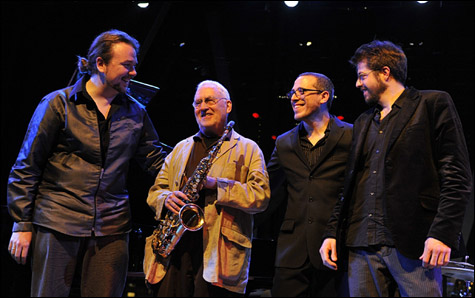
NOT SO LONE LEE With Minsarah (Weber, Ravitz, and Denson), Konitz once again has a working band. |
Charlie Kohlhase's love affair with jazz began with the avant-garde. As a high-school kid in Portsmouth, New Hampshire, he found that it was Ornette Coleman, Eric Dolphy, and the Art Ensemble of Chicago who rocked his world. Now 52, he remembers having had a passing interest in rock and pop — Crosby, Stills & Nash, maybe. On the other hand, "I bought John Coltrane's Meditations pretty quick."
For more than 20 years, Kohlhase — who plays mostly baritone and alto saxophones — has been a stalwart of the Boston scene. He joined the Either/Orchestra two years into its existence, then went on to lead a host of his own small bands. His WMBR radio show, Research and Development, celebrates its 13th anniversary this summer.
On his new Adventures (Boxholder), under the banner of his Explorer's Club septet, the tunes are not organized by chord progressions, and tonality is often unfixed (except perhaps for the set closer, the James Brown tribute "The Star of the Show"). And there's ferocious playing all around and plenty of avant-tussling. But there are also plenty of bold and brawny melodies in the ensemble writing, often laced with Kohlhase's particular brand of humor (especially in the titles), and with a sense of ensemble delicacy. The band can break into subgroups — trios and duets, sometimes over standard walking-bass swing, or in squalling dialogues. And then they'll come back together again for a blazing coda. The sense of form is never lost.
Either/Orchestra leader Russ Gershon remembers his first encounter with Kohlhase at a jam session at Charlie's Tap on Green Street in Cambridge. At some point, the two saxophonists found themselves facing off, blowing furiously into the bells of each other's horns. "That was his audition, I guess," says Gershon with a laugh. The two found that they shared an interest in jazz as a continuum, from the earliest to the most avant-garde. Kohlhase understood things like the importance of the great baritone player Harry Carney in anchoring the Ellington-band reed section, and he had his own impressive sound on the big horn. He blended a swing feel with melodic freedom while still being respectful of chord progressions. "It was a natural fit," Gershon says of their collaboration.
Kohlhase didn't decide to become a musician until he picked up the saxophone at age 18. He made trips to Boston to study with Stan Strickland. Eventually, he found his way to the legendary avant-garde trombonist Roswell Rudd, who was teaching at the University of Maine and had been advertising for private students. At one lesson, Rudd taught Kohlhase a raga form, explaining that he often used it in his own bands as a way to begin a set — setting up a drone figure and improvising over it. Kohlhase was in the midst of teaching himself Jazz 101 in his own hard-bop band, and he remembers telling Rudd, "I don't do that kind of thing in my band." Rudd looked at him and said simply, "Oh." Over a burger at Miracle of Science in Cambridge, Kohlhase laughs at the memory: "As if, why the hell can't you do that, what's the matter with you? And, of course, that's what Roswell had been doing his whole career, drawing on every aspect of the music — early jazz, swing, world music. That was a very profound lesson: why are you dividing this stuff up?"